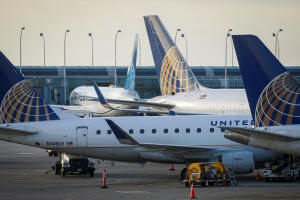Airlines remain bullish on travel demand despite mounting economic
worries
 Send a link to a friend
Send a link to a friend
 [January 18, 2023] By
Rajesh Kumar Singh [January 18, 2023] By
Rajesh Kumar Singh
CHICAGO (Reuters) - U.S. airlines posting strong financial results
remain upbeat about travel demand, even as economists and analysts say
the risk of an economic recession has gone up.
Carriers are enjoying the strongest travel demand since the start of the
COVID-19 pandemic, boosted by reopening of closed borders, a strong U.S.
dollar and rising corporate travel.
United Airlines Holdings on Tuesday forecast at least a four-fold jump
in full-year profit for this year as it expects travel-hungry customers
to fill planes.
Similarly, Delta Air Lines expects to nearly double its full-year
earnings this year.
The upbeat reports come just as over half of the 50 U.S. states are
exhibiting signs of slowing economic activity, breaching a key threshold
that often signals a recession is in the offing, the St. Louis Federal
Reserve Bank said in a report last month.
A worsening economic outlook and rising financial fragility of U.S.
households have sparked concerns about consumer spending.

Booming demand has helped carriers mitigate higher fuel and labor costs
through higher ticket prices, but any slowdown in consumer spending is
expected to undermine their pricing power.
Airline executives are downplaying that risk, saying the urge to travel
remains strong. If anything, they say, the relationship between
passenger revenue and broader economy is returning to pre-pandemic
trend.
United estimates domestic passenger revenue used to account for about
0.5% of the country's GDP. It expects the trend to be restored this
year, resulting in 15% higher revenue for the industry this year.
According to Delta's calculations, consumers will spend $30 billion on
travel in 2023.
[to top of second column] |

United Airlines planes are parked at
their gates at O'Hare International Airport ahead of the
Thanksgiving holiday in Chicago, Illinois, U.S., November 20, 2021.
REUTERS/Brendan McDermid

"We know...the public wants to travel in outsized amounts," Delta's
Chief Executive Ed Bastian said last Friday.
United's Chief Executive Scott Kirby last month said the word
recession wouldn't have been in his vocabulary, if he were not
reading or watching news as the airline had not seen any signs of it
in booking data.
The first quarter, after the holiday travel season, tends to be the
weakest season for the industry.
But Delta last week said advanced bookings for each month of the
current quarter is "significantly" ahead both in terms of passenger
revenue and volume compared to 2019.
Demand for flights to Europe is also robust and is expected to
generate record spring and summer revenues, it said.
Meanwhile, staffing and aircraft shortages across the industry are
expected to persist and limit capacity growth, underpinning the
pricing power carriers are currently enjoying.
United expects total revenue per available seat mile, a proxy for
pricing power, to be up 25% from a year ago in the current quarter.
"Demand remains strong, pricing is likely to remain favorable due to
industry capacity constraints," said Cowen analyst Helane Becker.
(Reporting by Rajesh Kumar Singh; Editing by Peter Henderson and
Aurora Ellis)
[© 2023 Thomson Reuters. All rights
reserved.]
This material may not be published,
broadcast, rewritten or redistributed.
Thompson Reuters is solely responsible for this content.
 |